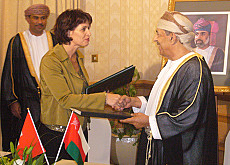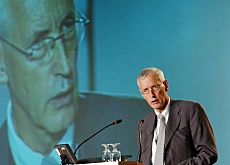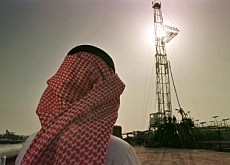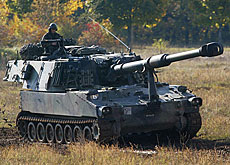Middle East trip aims to boost economic ties

Swiss Economics Minister Doris Leuthard is visiting the United Arab Emirates and Oman to help cement business links with the two booming economies.
While the UAE is Switzerland’s principal trading partner in the Middle East, Oman still remains a largely undiscovered country for Swiss companies.
The four-day trip, which began with the signature of an aviation accord in Oman on Saturday and was followed by talks with high-ranking ministers in both countries, is due to end on Tuesday.
It is the first stage in a government economic strategy – adopted at the end of October – aimed at moving towards free trade with the six-members of the Gulf Cooperation Council (GCC), which includes Saudi Arabia, Bahrain, Kuwait and Qatar.
The Swiss minister said on Sunday she was optimistic that an accord could be signed by next spring. “We only need one or two more rounds of talks,” she added.
Leuthard sees an agreement as the possible continuation of Switzerland’s earlier success in strengthening economic ties with Brazil, Russia, India and China. She also wants to help Swiss companies make up for ground lost on their competitors, who have been investing massively in the region.
Attractive Oman
Leuthard started her visit in Oman, becoming the first Swiss minister to visit the country. Relations with the Arab state are described by the foreign ministry as “good but not very intensive”.
Trade is currently modest. Swiss exports amounted to SFr111 million ($96 million) in 2006, whereas imports stood at SFr20 million.
But Oman is currently experiencing an economic upswing – its economy grew by six per cent last year – and is looking for foreign investors, says Elias Attia, secretary-general of the Arab-Swiss Chamber of Commerce.
“Oman is imagined also as a very good and strong partner for Switzerland. It is a very small country… but booming; it is strongly promoting tourism because it has a long history and nice beaches,” Attia told swissinfo.
“The country is also more flexible [towards foreigners] than Saudi Arabia or the Emirates,” he added.
Oman is looking to move away from its dependence on oil. Attia said the country was looking for investments in tourism, infrastructure, energy and water.
UAE boom
Switzerland has far more established trade links with the neighbouring UAE. Last year its exports totalled SFr1.75 billion, while imports totalled SFr635 million.
The UAE’s oil-rich economy is also thriving and has attracted a high number of foreign workers.
Swiss companies are mainly active in banking and other services, including the hotel industry, in the economic capital of Dubai or the capital Abu Dhabi.
Fewer Swiss are to be found in manufacturing and construction, but it is there that many opportunities lie, says Thomas Barth, a Swiss with 30 years’ experience of UAE who is managing partner of IMCC, a company active in the UAE oil and gas industry.
Lack of taxes, good infrastructure and flexible business laws help ease dealings, explained Barth, a former president of the Abu Dhabi Swiss Business Council, which promotes Swiss companies’ interests.
Underestimated
“The UAE is underestimated by a lot of Swiss as the building market boom is not like in Switzerland – we’re talking hundreds of construction cranes, billions being spent on infrastructure developments at one time,” Barth told swissinfo.
Challenges mainly lie in the different ways of doing business and cultural etiquette, he says, as well as lack of enforcement of legal decisions – but this is improving.
Barth says the local population has a good opinion of the Swiss as business partners. They also favour Switzerland as a holiday and investment destination.
He adds that Leuthard’s visit is therefore sending out all the right signals.
“We are one of the larger trading partners, not only in watches and jewellery. Politically [relations] have been left a bit on the side by Switzerland so this [visit] is the best thing that can happen,” he said.
swissinfo, Isobel Leybold-Johnson
The United Arab Emirates (UAE) is a federation of seven states – Abu Dhabi, Dubai, Ajman, Fujairah, Ras al Khaimah, Sharjah and Umm al Qaiwain – formed in 1971. It is governed by Supreme Council of Rulers which appoints the prime minister and the cabinet.
Oil is the main driver of the economy. The business and tourism sectors have helped fuel a construction boom. Three-quarters of the population are expatriate workers.
UAE has a population of 3.1 million and the average gross national income per capita is $23,770 (SFr27,400). It is one of the most liberal countries in the Gulf, and other cultures and beliefs are generally tolerated.
Oman, which occupies the southeastern part of the Arabian peninsula, is the oldest independent state in the Arab world. It is ruled by Sultan Qaboos bin Said.
Once fairly isolated, Oman opened up in the 1970s. Oil is a mainstay of the economy, fishing and agriculture also contribute. Tourism is currently undergoing a boom.
The country has a population of three million. The average gross national income per capita is $9,070. Oman is reported as being a hospitable country which has not been affected by militant Islamist violence.

In compliance with the JTI standards
More: SWI swissinfo.ch certified by the Journalism Trust Initiative




You can find an overview of ongoing debates with our journalists here. Please join us!
If you want to start a conversation about a topic raised in this article or want to report factual errors, email us at english@swissinfo.ch.